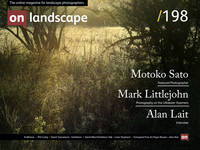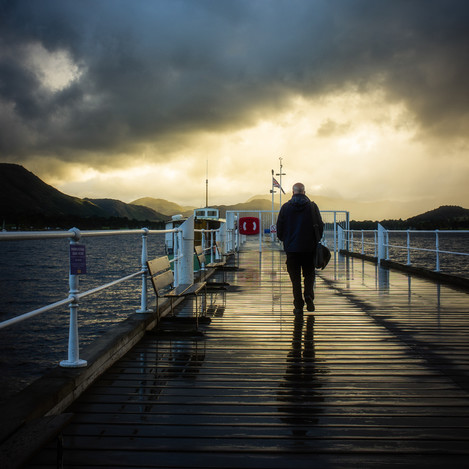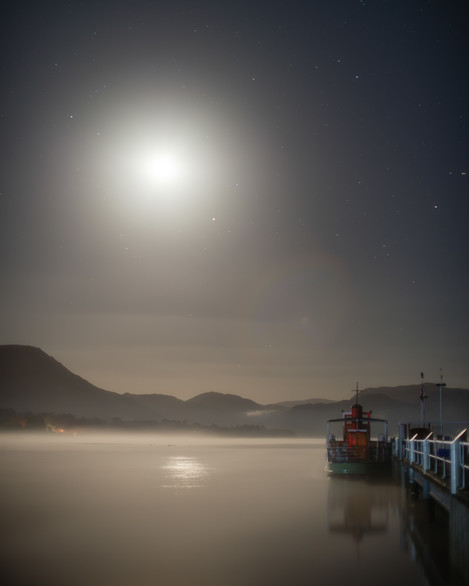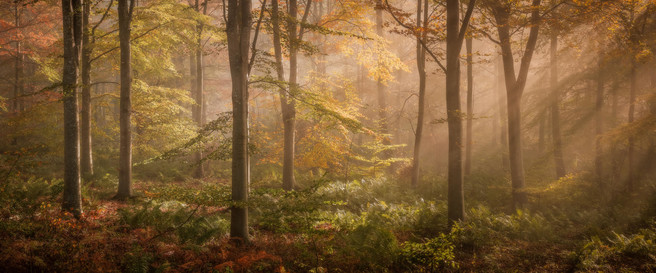Photography on the Ullswater Steamers

Mark Littlejohn
Mark Littlejohn is an outdoor photographer who lives on the edge of a beach in the desolate wastelands of the Highlands of Scotland. He takes photographs of anything unlucky enough to pass in front of his camera.
Over the past few years, Mark Littlejohn has written articles (click here for Mark's articles) and given a talk for us (at the Meeting of Minds conference 2016) and from Saturday 15th February – Saturday 16th May 2020 he'll be having an exhibition of photographs at the Joe Cornish Gallery. On the 21st of March we're organising a mini event where Mark Littlejohn, Joe Cornish and David Ward will be giving talks (more details at the bottom of the article).
To celebrate that, we asked Mark to revisit his work with the Steamers and talk about how working in this way has affected his photography. Mark also contributed loads of photographs, some old classics and many new creations.
I retired from the Police in late 2011, having completed 30 years service with Cumbria Constabulary. The last decade had been spent analysing paedophiles computers and reviewing the material they had been accessing, sometimes millions of images at a time. I needed something to relax me and it was photography that fulfilled this role. I spent the first year of my retirement wandering Ullswater and the Eden Valley taking various photographs. But I missed the camaraderie of my working years and in 2013 I decided that I should perhaps think of getting a wee job somewhere (or perhaps more accurately my wife wanted me out from under her feet). A friend told me that there were some seasonal jobs at the Ullswater Steamers starting in February. What could be better than to spend my days sailing up and down Ullswater in all weathers and getting paid for it. The operations manager was already a fan of my images and I was barely even interviewed. The only question was “When can you start?” I’ve been there seven years now and I have loved nearly every minute. I am currently a senior crew and have no interest in driving the boat. It would just get in the way of my photography.
However, I didn’t realise the effect that it would have on my photography. When I started in 2013 I had owned a digital SLR for three short, fun filled years. Being a wee bit old when I took up photography I’d decided to do it my way. I never read a book or studied a YouTube video. I just went out and pointed the camera at things I liked. Up until I joined the Steamers I shot quite a lot of images with a wider angle. I might get up close to my foreground and work out how I was going to shoot it. I still used a tripod. I still used filters. But when I started looking back at my seven years on the Steamers I realised that there was a lot more to this article than just a few images taken from the boats, or from wee spots I’d spotted from the boat as we sailed on by. On reflection, I realise that these few years changed my whole outlook. It changed the way I saw the world and how I wanted to capture it. It made me appreciate changes in the quality of light, the direction of light, how rain, sunlight, cloud, mist, time of the year, month, day and hour can change a well-known scene. I remember listening to Jem Southam and the way he intricately observed the same places over many years, examining the minutiae of detail contained within. I can see what draws some people to keep photographing the same location, over and over again. Admittedly my chosen location covers a bit more space than Jems.
I see other landscape photographers travelling all over the UK, consulting the latest photographers guidebook and going from honeypot location to honeypot location. In all probability ignoring unique scenes on a daily basis as they whizz past concentrating on their satnavs guiding them to the postcode of the next location. I am constantly uncovering new and hitherto unknown gems in an area I’ve already photographed countless times. Why would I need to travel when I have such riches on my doorstep?
Over the past few years, I have accumulated a number of what I term “work” photographs. I have sorted these into a small number of categories:
The Commute
I suppose we should start with the commute. I travel from the Eden Valley to the Lake District every morning. That makes it sound like a long journey but in fact, Penrith is only 5 miles from Ullswater and the two regions blend into each other over the five-mile gap. In fact, I often refer to the Pooley Bridge boat as sailing from the Eden Valley into the heart of the Lake District. I used to drive the staff minibus to work but I think people got a wee bit fed up of me making slight detours and the occasional emergency stop in order to grab a shot. These days I travel under my own steam and on some occasions try and get out before work if the forecast is good. At the end of the summer, three of the youngsters and I went up onto Striding Edge for dawn. Made for a long day but the fun of the morning made up for it. Admittedly they had more fun than me as I had to get back down for work while they were all off.
Boats and Crew
We run a fleet of five old heritage vessels, the two oldest being Lady of the Lake (1877) and Raven (1889). These two boats were built for Ullswater and have spent their whole service here. I have been trying to get photos of these two lovely old vessels in atmospheric conditions but for some reason all my favourites have been of Western Belle. She is a newish boat, built in 1935 and has been here for less than ten years. However, she always seems to be in the right place at the right time. Sometimes it is hard to work out the scale of the scenery but inclusion of one of the Steamers helps to show how majestic the mountains and crags are. With regards to the crews, some of them are nearly as old as the boats. A lot are like me – they have had their first life and are just enjoying their second. Usually in far nicer circumstances than their first. It makes for a very relaxed working day as your friend and colleague has usually seen it, done it and isn’t fazed by anything and isn’t interested in indulging in any work related politics. It also means that there are no issues with me spending a fair bit of time taking photographs. I’ve seen boats go out where the average age of the crew is 65. It makes me laugh when I’m selling tickets and an older person (usually dressed in several hundred pounds worth of walking clothes) says “two concessions to Glenridding”. I always reply “We don’t give concessions to the elderly, we employ them”.
Weather
When I started working on the steamers I never really thought much about taking photographs in the rain. It wasn’t really something I did. I won the take-a-view Landscape Photographer of the Year with an image taken in horrendously heavy rain. The forecast for that day was horrendous, but it didn’t bother me. Working on the lake had shown me how conditions like that can be wonderfully atmospheric and show how dramatic and real our scenery is. I was taking photographs from Lady of the Lake during a storm and an old lady came up and said, “What are you taking photographs of? It's miserable”. I really did want to reply, “that’s not miserable. You are”. On another occasion, I remember once we had finished a late charter at Pooley Bridge on Lady and we had to travel back up to Glenridding to finish. As we moved away from the pier we were hit by a storm and had extremely heavy rain. In the gathering gloom, we sailed up the Lake and the skipper started playing “Ride of the Valkyries” over the loudspeaker system. It was the most wonderfully surreal experience. Very heavy rain has a way of flattening out the wake and other waves, almost giving them the appearance of sand dunes. It is a most unusual experience. A big advantage to wet weather photography from the boat is that you can keep everything dry downstairs, keep an eye on the way the weather conditions match the scenery and then just make a quick appearance under the canopy for a shot and things don’t get too wet.
Scenery and “Spotting”
I’ve spent years walking around Ullswater and yet working on the boats surprised me by showing me some gorgeous new views that I wasn’t prepared for. The aspect of my photography that I am most proud of is the fact that a huge number of my favourite images are taken within 10 miles of home. I appreciate that I am lucky enough to live within easy distance of some stunning scenery but I am a firm believer in knowing your local area. Light plays a major part in my photography and knowledge of the how the sun works in different areas in different seasons and at different times of the day is important. I tend to plan my shots for specific locations/times when the sun is favourable and dynamic range isn’t such an issue. Whilst I would tend to guard against going out with a preconceived shot in mind, it certainly helps if you know in advance the probable direction and angle of the light. One of my favourite shots from the boats is “Belle of the Ball”. This is a particular tree by Purse Point that changes colour very quickly and then divests itself of its foliage almost immediately gaining its Autumn coat. In mid October the sun stays quite low and sneaks in past the corner of Place Fell just as the early boat leaves Glenridding. This means that while it strikes the Belle of the Ball beautifully, it leaves the majority of its ‘colleagues’ in the shade. The different ways the light can affect shots on Place Fell, with its dense forest of old Silver Birches, throughout the course of the year can be quite startling, showing that you can’t beat in depth knowledge of a location. I always look forward to coming round the corner of Silver Point towards Glenridding. It is at this point that you get your first proper view of the end of the Lake, with St Sundays Crag rising majestically above Glenridding. We also have my favourite Scotch Pines, standing out on a spur of rock in Blowick Bay, with Caudale Moor looming up in the background. Another favourite section is Hallinhag Woods, nestling into the base of Hallin Fell. It is at this point where there is a plaque in commemoration of Lord Birkett, who managed to fight off attempts to dam the Lake in 1962. Being on a boat means you can quite often change your composition simply. I really do feel that there is a single best place to take an image from and I am extremely pedantic about getting the right perspective. Arrangement of the elements is key. Over the last few years I’ve concentrated on training the skippers to change course slightly in order to take advantage of certain conditions. Moving slightly further out from the shore or just trying to line up certain aspects of the shoreline becomes a matter of routine. I’ve also trained them to shout over the tannoy “Mark to the wheelhouse” if they seen some light or a change in the conditions that might interest me…
A Different Viewpoint
Viewed from the lake you see things that are invisible from any of the numerous paths that crisscross the area. I’ve travelled over the squiggly road to Martindale numerous times but conditions in the wet mean the road sometimes gleams and you can see it from miles off. I noticed this several times from the boat and realised that the front of Bonscale Pike would make an excellent vantage point. Likewise, Fusedale – a little valley that I think has wonderfully photogenic layers and angles. I never saw that till approaching the jetty at Howtown. There are just so many wee nooks and crannies to explore. It really does reinforce my thinking that instead of fleeing from one location to the next we should just concentrate on becoming intimate with one area. It teaches you more about composition and what makes a good landscape photograph than a hundred formulaic magazine articles and books. Intimacy with your local landscape allows you to impart more emotion into your images without even realising it. If you don’t feel any emotion for your subject how do you expect your audience to feel anything when they look at your images.
Abstracts
Abstracts are something I love yet are images I never actually set out to achieve. They tend to come to me while I’m on the boats. I tend to take them when I’m completely relaxed and at ease with both my surroundings and myself. People put themselves under too much pressure to get a shot. Whether that’s because they get limited opportunities and feel that they have to maximise their time and have to produce something.. I take a lot of images with my phone when I’m on the boats – this tends to add to the sense of relaxation. There is no pressure in a phone shot. It's of the moment and in the moment.
I'm on the Phone
I take a lot of images with my phone when I’m on the boats – this tends to add to the sense of relaxation. I sometimes feel pressured to produce something. Working on the boats and taking pictures on my phone takes away that element and leaves me almost carefree and back to basics, taking quick snaps of things I like. More or less my whole approach since taking up photography.
Working on the boats is an endless voyage of discovery. I always remember a comment made by a passenger a while back “So you just sail backwards and forwards on Ullswater all day. That must get boring”.
To be bored with the Steamers would mean I was bored with life.
Mark Littlejohn Exhibition at the Joe Cornish Gallery
Acclaimed photographer Mark Littlejohn is exhibiting at the Joe Cornish Gallery for their first 'Focus on...' exhibition of 2020 from Saturday 15th February – Saturday 16 May.
Mark has a unique approach to landscape photography, preferring the less popular view and concentrating his efforts to the earlier part of the day. He sees little point in constantly travelling in search of exotic locations when a beautiful image can be right on your front door, which for Mark is Penrith in Cumbria located between the Eden Valley and Ullswater.
Saturday 21st March - Mini Meeting of Minds
On Saturday 21 March, Joe Cornish Galleries in association with On Landscape are delighted to be hosting a Mini Meeting of Minds Conference around Mark Littlejohn’s exhibition A Decade of Moments. Confirmed speakers so far are photographers Mark Littlejohn, Joe Cornish and David Ward. The afternoon and evening will comprise a conference followed by a private buffet.
Tickets will be on sale in early February so save the date and keep an eye on your email!

















































